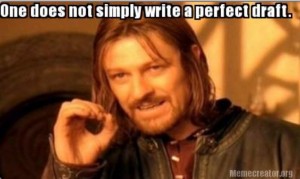 Moving on from my previous post about Die Hard, workshop etiquette and providing fictional/film examples, here’s what I’d say about The Imitation Game
Moving on from my previous post about Die Hard, workshop etiquette and providing fictional/film examples, here’s what I’d say about The Imitation Game. This is the problematic stuff, and would come later in the critique than the section where I praised the characterization, the weighty and worthwhile subject matter, and the general structure of the story, which holds together in a decently coherent fashion.
Hi, Graham and Morten,
PROBLEMATIC
- Though the story moves from beat to beat in a logical manner, and is effective in achieving the desired emotional effect, it lacks subtlety. The story feels heavy-handed, on the nose, as if the characters are bellowing slogans like, “War is bad!” and “It takes more than guns to win these things!” and “Look at this amazing maladjusted smart guy and all the people he saved!” and “Wow, isn’t it horrific and amazing that every day he and his band didn’t solve the problem, all sorts of people died?” I’m not saying it doesn’t work, but it’s fundamentally clunky.
- The details of your chosen historical period and the military/intelligence community are for the most part accurately rendered, but you have chosen to simplify the chain of command by making Turing and his guys seem responsible for an enormous swath of military action, including calling or cancelling bombing raids. I understand why simplifying is often a good choice, but it’s less interesting, in this case, than if you tried to hint at the complexity.
- Turing’s male sidekicks are somewhat slenderly characterized. They blend together in my mind, forming something of a multi-headed bully when they’re not on his side and a multi-headed cheerleader when they are. The only one who stands out at all is the fellow with a brother in the Navy. That’s less about characterization and more about the story attached to him.
- I’m not sure what I think of you showing us apple and cyanide during the story, foreshadowing the manner of Turing’s death, without explicitly saying that he poisoned himself. Apples have both Biblical and fairy-tale freight, and I wonder if you couldn’t do something more with this.
All of the above is clear and yet it’s respectfully worded. It’s not so “nice” that the intent is lost, but it doesn’t try to snark, show off my huge brain, or score points.
It would be easy to push that line, especially with the first item. I could simply add a touch of sarcasm to the sentences I use to illustrate the story’s various points. (Even if I tool the last one up slightly “Gee willikers, do you all get that every day Turing and his plucky band didn’t solve the problem, all sorts of people died?” the tone changes.)
The exercise here, if you missed the previous post, is to critique a movie that many people will have seen, as if it were actually a novel or short story submitted to one of my classes. It’s a chance to practice critique. And to get to say, “Dear Francis Ford Coppola, about this thingie you’ve written…” Which is just, I hope, fun.
Next in this series, we will discuss my deep and abiding hatred of the most recent X-Men movie.



One thing the movie does get across is the “fog of war” — that commanders have to make life-or-death decisions every day on the basis of information which is at best partial and often outright wrong. And which they -know- is partial or wrong.
And you can’t not decide — that’s a decision too. Often a third-rate decision made -now- is infinitely better than a perfect one made too late.
Too much fiction portrays war as like a fencing match. A better metaphor is a darkened room knee-deep in mud, with the terrified participants blundering around trying to beat each other to death with shovels.
One thing they touch on too is that raw data is easier than analysis. Picking out what’s significant and turning it into an accurate picture is much, much harder. Double that as “identity-protective cognition” kicks in, the (usually unconscious and quite irresistible) tendency of people to select data to protect the narrative they share with their social reference group.
Given that the information is always ambiguous anyway, it’s perfectly possible to make a choice for multiple interpretations and the psychological and institutional pressure to pick the one that tells people what they want to hear is overwhelming.
That’s why the Germans never believed we’d cracked Enigma. Acknowledging that would have meant upheaval, the wrecking of countless careers, the upsetting of institutional power balances, and in the context of Nazi Germany, probably a lot of executions and people getting sent to concentration camps. So the data was reinterpreted to support other explanations.
It’s also what happened to us at Arnheim, the “bridge too far”. There was plenty of data suggesting that the Germans were there in much greater strength than the plan anticipated… but there was also enough contradictory data that it could be spun the other way and a lot of important people were emotionally invested in the operation.
End result, paratroopers got dropped right on top of two Waffen-SS panzer divisions they didn’t think were there.
I agree–about the fog of war phenom, about picking the relevant pieces out of seas of data, and about institutional stodginess. In a review, I’d have been more even-handed. This is really just a piece of a larger lecture I’m building for Novels II and III, though.